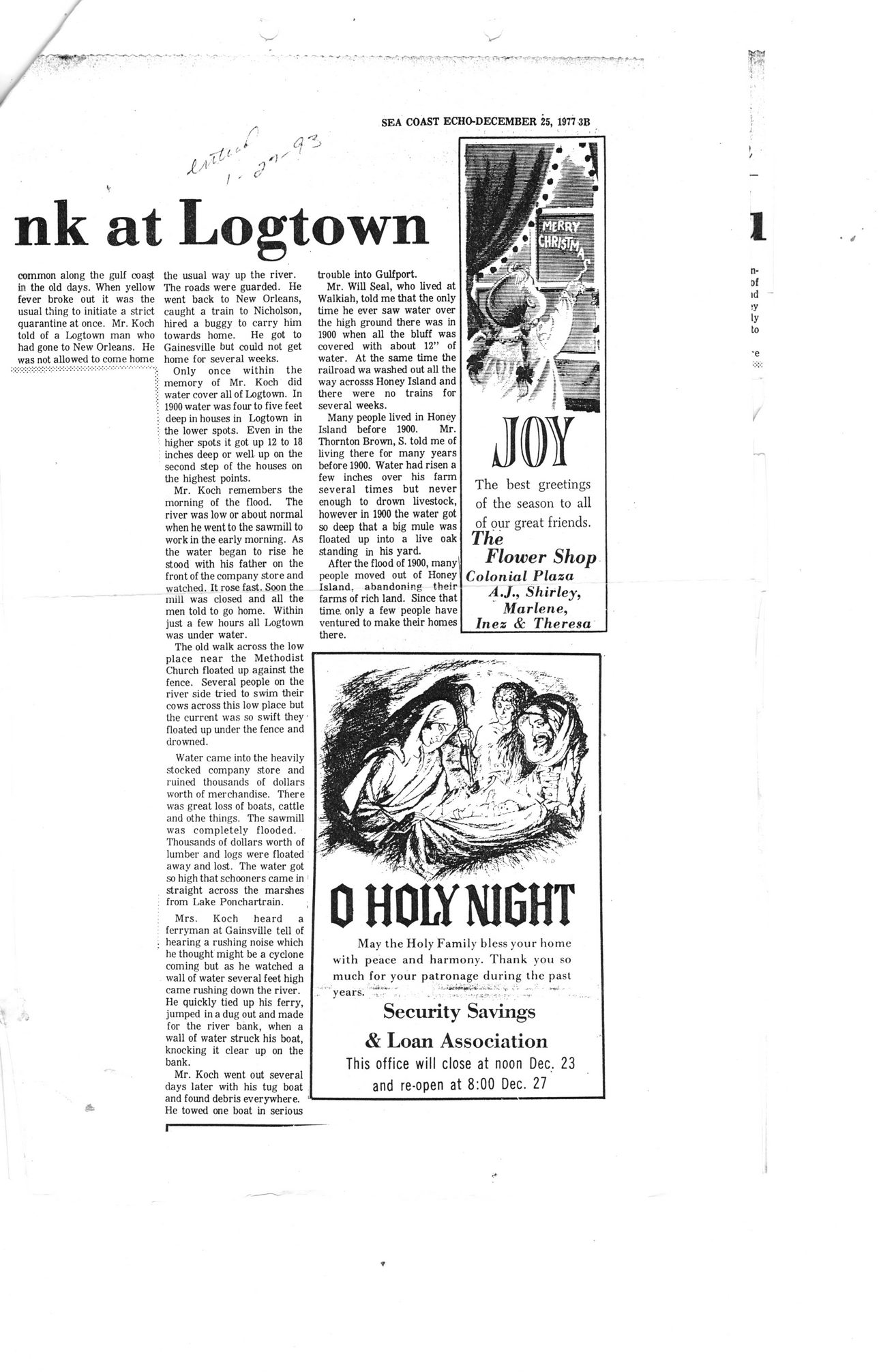This text was obtained via automated optical character recognition.
It has not been edited and may therefore contain several errors.
/ / i. : i - I*1',. <>' SEA COAST ECHO-DECEMBER 25, 1977 3B nk at Logtown common along the gulf coast in the old days. When yellow fever broke out it was the usual thing to initiate a strict quarantine at once. Mr. Koch told of a Logtown man who had gone to New Orleans. He was not allowed to come home the usual way up the river. The roads were guarded. He went back to New Orleans, caught a train to Nicholson, hired a buggy to carry him towards home. He got to Gainesville but could not get home for several weeks. Only once within the memory of Mr. Koch did water cover all of Logtown. In 1900 water was four to five feet deep in houses in Logtown in the lower spots. Even in the higher spots it got up 12 to 18 inches deep or well up on the second step of the houses on the highest points. Mr. Koch remembers the morning of the flood. The river was low or about normal when he went to the sawmill to work in the early morning. As the water began to rise he stood with his father on the front of the company store and watched. It rose fast. Soon the mill was closed and all the men told to go home. Within just a few hours all Logtown was under water. The old walk across the low place near the Methodist Church floated up against the fence. Several people on the river side tried to swim their cows across this low place but the current was so swift they ■ floated up under the fence and drowned. Water came into the heavily stocked company store and ruined thousands of dollars worth of merchandise. There was great loss of boats, cattle and othe things. The sawmill was completely flooded. Thousands of dollars worth of lumber and logs were floated away and lost. The water got so high that schooners came in straight across the marshes from Lake Ponchartrain. Mrs. Koch heard a ferryman at Gainsville tell of hearing a rushing noise which he thought might be a cyclone coming but as he watched a wall of water several feet high came rushing down the river. He quickly tied up his ferry, jumped in a dug out and made for the river bank, when a wall of water struck his boat, knocking it clear up on the bank. Mr. Koch went out several days later with his tug boat and found debris everywhere. 1 He towed one boat in serious I------------------------------- trouble into Gulfport. Mr. Will Seal, who lived at Walkiah, told me that the only time he ever saw water over the high ground there was in 1900 when all the bluff was covered with about 12” of water. At the same time the railroad wa washed out all the way acrosss Honey Island and there were no trains for several weeks. Many people lived in Honey Island before 1900. Mr. Thornton Brown, S. told me of living there for many years before 1900. Water had risen a few inches over his farm several times but never enough to drown livestock, however in 1900 the water got so deep that a big mule was floated up into a live oak standing in his yard. After the flood of 1900, many people moved out of Honey Island, abandoning their farms of rich land. Since that time, only a few people have ventured to make their homes there. The best greetings of the season to all of our great friends. The Flower Shop Colonial Plaza A.J., Shirley, Marlene, Inez & Theresa 0 HOLY NIGHT May the Holy Family bless your home with peace and harmony. Thank you so much for your patronage during the past years. Security Savings & Loan Association This office will close at noon Dec. 23 and re-open at 8:00 Dec. 27 1 n- Df id ;y ly to •e *

Logtown Federal gunboat sunk at Logtown (2)